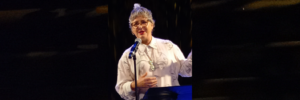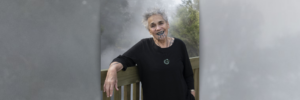
Tīhema Baker (Raukawa te Au ki te Tonga, Ātiawa ki Whakarongotai, and Ngāti Toa Rangatira) is a writer and Tiriti o Waitangi-based policy advisor from Ōtaki. He has a Master of Arts in Creative Writing from the International Institute of Modern Letters at Victoria University of Wellington, for which he wrote this novel.
Kia ora Tīhema! Congratulations on the huge success of your novel Turncoat – we understand it has been so popular it has needed an urgent reprint to keep up with demand. Can you tell us a little bit about Turncoat, and who should be picking up a copy?
Kia ora! And thank you – I hoped that Turncoat would resonate with people but never imagined the reception it’s had so far. For those who haven’t heard anything about it, Turncoat is a satirical sci-fi that serves as a commentary on the experiences of Māori public servants. It’s set in a future where Earth has been colonised by Aliens and Humans have become a minority on their own planet. A young, idealistic Human named Daniel tries to make a difference for his people by getting a job for the Alien government. I think Māori public servants will definitely relate to Daniel, but the book is really about putting Pākehā in the shoes of a colonised people and inviting them to imagine that experience.
Which books are whanaunga to Turncoat? Who helped you bring this book into the world?
I have to acknowledge the tuakana to Turncoat: my first novel Watched and its sequels Exceptional and Kaitiaki (The Watchers Trilogy). They are very different books to Turncoat and they will never have the sort of profile that Turncoat seems to, but they taught me how to write novels in the first place.
The seeds for Turncoat were probably planted by George Orwell’s Animal Farm. I studied this in high school English, while I also happened to be studying the Russian Revolution in History (because we didn’t really study Aotearoa history back then, go figure!). I remember thinking Animal Farm was genius in the way it simplified the complexity of revolutionary Russia – by taking the same circumstances and transplanting them to another context, it exposed how ridiculously unjust those circumstances were. I became fascinated with the idea of doing the same with our own history and te Tiriti o Waitangi, and that idea would eventually become Turncoat.
What tikanga or kawa do you apply to your writing process?
This is a tricky one because my approach to writing varies depending on the project. Writing Turncoat, for example, was a completely different process than my other three novels. But I guess if there was a consistent kawa across all of my writing, it’s that I prepare for and protect my writing time as best as I can. Writing isn’t something I can just “do”; it requires time and space and energy, so I plan in advance to ensure all of that is available to me. I also do most of my “writing” – by which I mean character development, plotting etc – in my head, while I’m doing other things like going for a run or housework. So when I’m finally ready to commit all that thinking to paper, I take that quite seriously and treat it as such.
It’s our understanding that the IIML is a predominantly Pākehā space, what was it like to write Turncoat there? What is your advice to other Māori considering taking papers or courses there?
It is a predominantly Pākehā space, but so are most spaces I navigate day-to-day, including my job as a public servant. That’s what Turncoat is all about! So I’ve had a lot of practice at keeping myself and my Māoritanga safe in Pākehā institutions. I went into the IIML with a very clear vision for Turncoat and how I was going to achieve it. And, really, I found the experience exactly what I needed. I had a very supportive class of fellow writers who helped shape the book. And I was really lucky to have the guidance of two incredible kaituhi Māori in Tina Makereti, who was my supervisor and course convenor, and Anahera Gildea who was kaitautoko for tauira Māori.
My advice to other Māori considering studying at the IIML is, firstly, do it! But, as with entering any Pākehā institution, it always helps to have a support network around you – whether that be fellow writers, mentors, or whanaunga.
What do you think your tīpuna would think of your book? What would their reactions be?
I like to think they would be proud of it. I often find myself thinking of my tūpuna and invoking their wairua. Tūpuna like Te Rangihīroa, who signed te Tiriti. Or Te Kākākura Wi Parata, who also tried to influence the machinery of government from the inside by becoming one of the earliest Māori Members of Parliament – and like me, I think, found that it was nearly impossible. Our tūpuna were storytellers, and although there’s a certain irony in the fact that Turncoat is told through a medium that would be completely “Alien” to them, I think they would appreciate what I’m trying to do with it.
If this pukapuka had a soundtrack, what would be on the playlist?
First and foremost, Mac Miller’s Swimming was pretty much the soundtrack to me writing Turncoat. The album really resonated with me at the time – Mac Miller died shortly after its release after succumbing to addiction, and it felt like such a tragedy that this should be the last release by an artist as talented as him.
But there is one song in particular that is referenced multiple times throughout Turncoat, and has major emotional significance to the narrator, Daniel: https://www.youtube.com/watch?v=dQw4w9WgXcQ
What are your aspirations for this book?
I guess my aspirations are quite simple: I just want people to read it. Read it, and reflect. What does it mean to be colonised? What is your place in a colonised world? What is within your power to change, and are you willing to do it? Are you who you tell yourself you are?
What projects are you working on now or hope to be working on in the future?
With a one year old tama in my life now, I don’t see myself writing any more novels for a while! But I do have an idea for an historical fiction novel that I am very much looking forward to writing when the time is right. For now, I’m mostly using whatever writing time I can find to try my hand at non-fiction – particularly essays. It’s kind of new territory for me and I’m enjoying exploring it.
What advice do you have for emerging Māori writers?
I’ve always felt funny about the notion of giving “advice” to other writers. Writing – at least as I know it – is such a personal act; what works for me isn’t going to work for everyone else, and part of the beauty of growing as a writer is discovering what works for you. So my best advice for Māori writers is not so much about craft or method, but a simple plea to keep telling our stories. Speaking of Pākehā institutions, Turncoat was rejected by multiple publishers. It’s easy to take that as a sign that your story isn’t “good enough”, but I knew that Turncoat had something important to say and I was determined to get it out there. Multiple reprints in less than two months since launch, and regular messages from total strangers contacting me to say how strongly the book spoke to their experiences or caused them to reflect, tells me I was right. Keep telling our stories. They need to be heard.
Photo credit: Ebony Lamb




